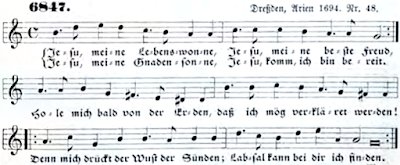Here is my translation of the wedding hymn, “Vater! der du deinen Namen” (Caspar Neumann, d. 1715), in GGELB #361 with melody assignment “Unser Sabbath geht zum Ende” and omitting stanzas 1–2, thus beginning “Nun das Werk ist angehoben.” The original source is noted below the stanza there with the ascription to Caspar Neumann. Fischer omits it from his lexicon under either title. I find it in the appendix of the posthumous Caspar Neumanns Kern aller Gebete und Gesänge (1732), p. 386, with title “Second Wedding Aria, to the tune: ‘Unser Sabbath geht zum Ende.’” It was included in the Preußen Gsb 1761, 1787. I have not yet discovered an image of the melody specified, unless a more common is meant by the text, such as “Herr, ich habe mißgehandelt” and “Unser Herrscher, unser König,” which may be found more easily, but which require a repetition of the last two lines of music. Alternately, I find in Zahn the pictured melody, which requires only the omission of the repeats, and is furthermore designed for such church “arias,” coming as it does from the Dresden Arien (1694).
FATHER, who Thy title holy
Hast on mortal men bestowed:
Bless, we pray, Thy servants lowly,
Reconciled by Jesus’ blood.
For with all both old and tender,
Thou art fatherhood’s defender.
(For with all both old and tender,
Thou art fatherhood’s defender.)
2 We may speak a pleasant blessing,
But without Thee, it must fall;
Thou, the height and depth possessing,
Art the Lord who workest all.
We, but men, who come proposing;
Thou, our God, Thy will disposing.
(We, but men, who come proposing;
Thou, our God, Thy will disposing.)
3 Let the gift Thou here hast given
To its blessed purpose come;
Pour Thy blessing down from heaven
On Thy children and their home,
Rest and peace abundant give them,
And at last in bliss receive them!
(Rest and peace abundant give them,
And at last in bliss receive them!)
Translation © 2024 Matthew Carver.
GERMAN
Vater! der du deinen Namen
auch den Menschen hast gelehnt:
segne deiner Knechte Samen,
die dein Sohn dir hat versöhnt.
Denn du mußt bei Jung und Alten
Vaterstatt allein verwalten.
Denn du mußt bei Jung und Alten
Vaterstatt allein verwalten.
2 Unser Segen hat nur Worte,
unser Wunsch ist ohne Kraft;
aber du an deinem Orte
bist der Herr, der alles schafft.
Wir sind Menschen, die was denken;
du ein Gott, der es kan schenken.
Wir sind Menschen, die was denken;
du ein Gott, der es kan schenken.
3 Nun das Werk ist angehoben,
führe du es selig aus;
benedeie selbst von oben
deine Kinder und ihr Haus.
Laß sie Fried und Ruh genießen,
und ihr Leben wohl beschließen.
Laß sie Fried und Ruh genießen,
und ihr Leben wohl beschließen.


No comments:
Post a Comment